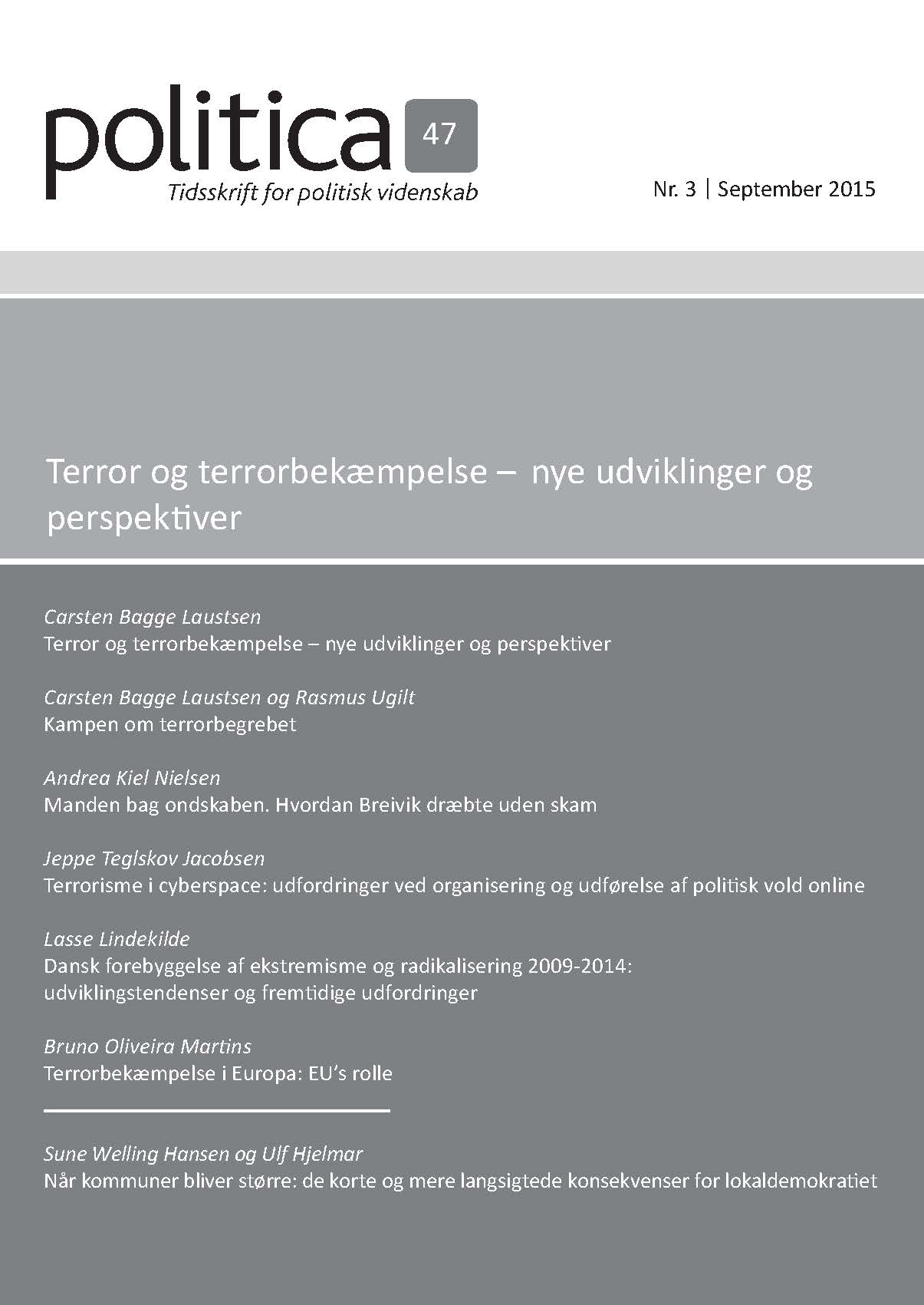Kampen om terrorbegrebet
DOI:
https://doi.org/10.7146/politica.v47i3.131441Resumé
Hvad er terror? Spørgsmålet har været overraskende vanskeligt at give et definitivt svar på. Vi går til problemet ved at bruge William Connollys teori om essentielt omtvistede begreber. Her er tre karakteristika væsentlige: begrebers normativitet, kompleksitet og anvendelse. Vores formål er ikke at præsentere en endelig definition af terrorbegrebet, men derimod at give en ny ramme for studiet af kampen om begrebets mening. Samtidig positionerer vi os i modsætning til såvel realistiske som konventionalistiske tilgange til at definere begrebet som til andre og mere brugte tilgange til studiet af kampen om dets mening. Vi påpeger således forskellene på vores tilgang og dem, der eksempelvis bruges inden for analyser af hegemoni og diskursive formationer og inden for begrebshistorie. Vi argumenterer for, at Connollys tilgang kan udgøre en produktiv ramme for undersøgelse af begrebets kontestering, fordi den belyser, hvad det overhovedet vil sige, at et begreb er essentielt omtvistet, og fordi den tillader os bedre at se forskellige niveauer af enighed og uenighed.
Referencer
Arendt, Hannah (1972). Crisis of the Republic. New York: Harcourt Brace & Company.
Cavallaro, James, Steven Sonnenberg og Sarah Knuckey (2012). Living under Drones: Death, Injury, and Trauma to Civilians From US Drone Practices in Pakistan. New York and Stanford: Stanford Law School.
Connolly, William E. (1993). The Terms of Political Discourse. Oxford: Blackwell Publishing Inc.
Cramon, Lærke (2015). Terroristen, der ikke gør en hveps fortræd. Information, 9. august.
Freeden, Michael (1994). Political concepts and ideological morphology. The Journal of Political Philosophy 2 (2): 140-164.
Gallie, Walter Bryce (1955-56). Essentially contested concepts. Proceedings of the Aristotelian Society 56: 167-198.
Galtung, Johan (1971). A structural theory of imperialism. Journal of Peace Research 8 (2): 81-117.
Hansen, Birthe (2003). At definere terrorisme. Arbejdspapir 2003/08. København: Institut for Statskundskab, Københavns Universitet.
Herschinger, Eva (2011). Constructing Global Enemies: Hegemony and Identity in International Discourses on Terrorism and Drug Prohibition. New York: Routledge.
Hoffman, Bruce (1999). Terrorism and Weapons of Mass Destruction: An Analysis of Trends and Motivations. Santa Monica: RAND.
Hoffman, Bruce (2006). Inside Terrorism. New York: Columbia University Press.
Jackson, Richard (2007). Constructing enemies: ”Islamic terrorism” in political and academic discourse. Government and Opposition 42: 394-426.
Jackson, Richard (2008). An argument for terrorism. Perspectives on Terrorism 2 (2): 25-32.
Lippert-Rasmussen, Kasper (2014). Det er ikke svært at definere terrorisme. Politiken, 26. oktober. http://politiken.dk/debat/profiler/filosofferne/ECE2465296/det-er-ikke-svaert-at-definere-terrorisme/
Meisels, Tamar (2008). The Trouble with Terror. Liberty, Security, and the Response to Terrorism. Cambridge: Cambridge University Press.
Netanyahu, Benjamin (1986). Terrorism. How The West Can Win. New York: Avon Books.
Palonen, Kari (2003). Four times of politics: policy, polity, politicking, politicization. Alternatives 28 (2): 171-186.
Primoratz, Igor (2013). Terrorism. A Philosophical Investigation. Cambridge: Policy Press.
Saul, Ben (2002). The challenge of defining terrorism. http://www.isn.ethz.ch/layout/set/print/content/view/full/2460?id=en&id=152677
Schmid, Alex P. (1984). Political Terrorism: A Research Guide to Concepts, Theories, Data Bases, and Literature. Amsterdam: North-Holland Publishing Company.
Schmid, Alex P. og Albert J. Jongman (1988). Political Terrorism: a New Guide to Actors, Authors, Concepts, Data Bases, Theories and Literature, 2nd ed. Amsterdam: North-Holland.
Silke, Andrew (2001). The devil you know: continuing problems with research in terrorism. Terrorism and Political Violence 13 (4): 1-14.
Smyth, Marie Breen et al. (2008). Critical terrorism studies – an introduction. Critical Studies on Terrorism 1 (1): 1–4.
Stampnitzky, Lisa (2013). Disciplining Terror. How Experts Invented ”Terrorism”. Cambridge: Cambridge University Press.
Thorup, Mikkel (2008). Pirater, terrorister og stater. Aarhus: Klim.
Thorup, Mikkel (2009). Fra skræk og rædsel til politik – tidlige kapitler i terrorbegrebets begrebshistorie. Kritik 42 (192): 96-108.
Walther, Rudolf (2004). Terror, Terrorismus, pp. 323-440 i Otto Brunner, Werner Conze og Reinhart Kosellek (red.), Geschichtliche Grundbegriffe, Band 6. Stuttgart: Klett-Cotta.
Weber, Max (1921). Wirtschaft und Gesellschaft. Tübingen: Mohr Siebeck
Wilkinson, Paul (2001). Terrorism versus Democracy. The Liberal State Response. London: Routledge.
Žižek, Slavoj (2009). Violence. Six Sideways Reflections. London: Profile Books.
Zulaika, Joseba og William A. Douglass (1996). Terror and Taboo: The Follies, Fables, and Faces of Terrorism. London: Routledge.
Downloads
Publiceret
Citation/Eksport
Nummer
Sektion
Licens
LicensOphavsretten tilhører Politica. Materialet må ikke bruges eller distribueres i kommercielt øjemed.





